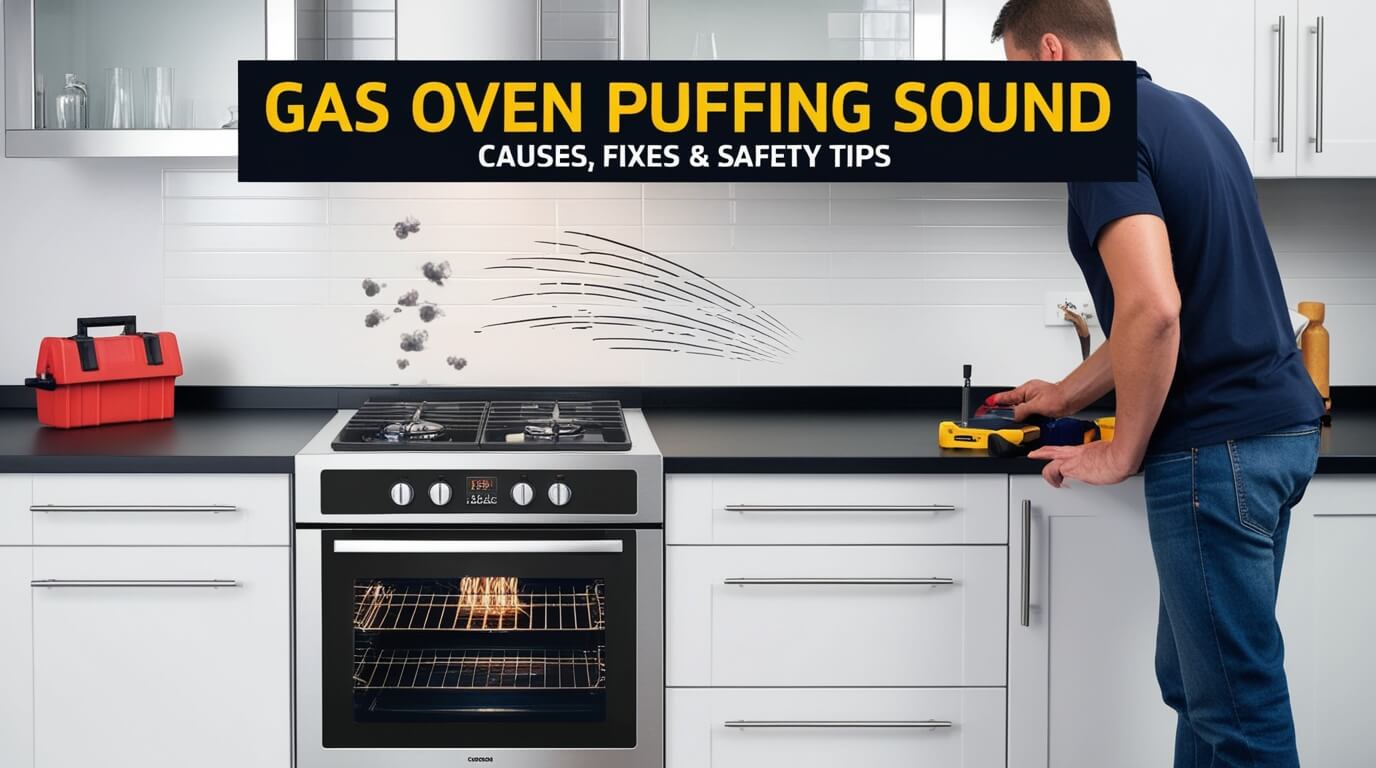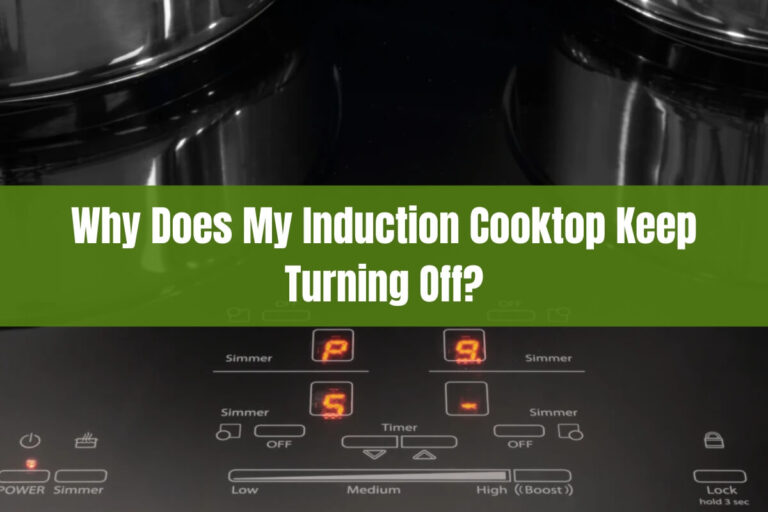
Is your gas oven making strange noises? A puffing sound from your gas oven is often caused by delayed ignition, a dirty igniter, or air-to-gas ratio issues. While sometimes normal, persistent puffing noises may indicate a problem that needs attention. This article will explore the reasons behind these sounds, how to fix them, and when to call a professional.
Understanding the Puffing Sound in Gas Ovens
Gas ovens are popular for their precise temperature control and even cooking. But they can sometimes produce unexpected noises that might concern homeowners.
What Does a Gas Oven Puffing Sound Like?
A puffing sound in a gas oven often resembles a quick “whoosh” or “poof.” It’s typically brief but noticeable, especially in a quiet kitchen. Some describe it as similar to a small contained explosion or the sound of a gas burner igniting.
Is a Puffing Sound in a Gas Oven Normal?
Occasional puffing sounds, especially during startup or temperature changes, are usually normal. However, frequent or loud puffing noises may signal a problem. It’s crucial to pay attention to when and how often these sounds occur.
Common Causes of Gas Oven Puffing Sounds
Several factors can lead to puffing sounds in your gas oven. Let’s examine the most frequent culprits.
Dirty or Faulty Igniter
The igniter is a key component in your gas oven. It heats up to light the gas and start the cooking process. When it’s dirty or failing, it may not ignite the gas promptly, leading to a buildup and sudden ignition – causing that distinctive puff.
Gas Valve Issues
Problems with the gas valve can result in irregular gas flow. This might cause too much gas to accumulate before ignition, resulting in a puffing sound when it finally lights.
Improper Air-to-Gas Ratio
Gas ovens need the right balance of air and gas for proper combustion. If this ratio is off, it can cause delayed ignition and puffing sounds. The air shutter, which controls airflow, may need adjustment.
Loose Oven Components
Sometimes, the problem is as simple as loose parts. Burner caps, oven floors, or other components that aren’t properly secured can create spaces where gas accumulates, leading to puffing sounds upon ignition.
How to Diagnose the Source of Gas Oven Puffing?
Before attempting any fixes, it’s important to identify the exact cause of the puffing sound. Here are some diagnostic steps you can take.
Visual Inspection Techniques
Start by examining your oven visually. Look for:
- Dirt or debris around the igniter
- Misaligned burner parts
- Signs of wear on components
A flashlight can help you see into the darker corners of your oven.
Listening for Specific Sound Patterns
Pay attention to when the puffing occurs:
- During preheating
- When the oven cycles on to maintain temperature
- Only with certain settings (bake vs. broil)
These patterns can provide clues about the underlying issue.
When to Use a Multimeter
For those comfortable with basic electrical testing, a multimeter can check the igniter’s functionality. However, if you’re unsure, it’s best to leave this to a professional.
DIY Fixes for Gas Oven Puffing Sounds
Some causes of puffing sounds can be addressed without professional help. Here are a few DIY solutions to try.
Cleaning the Igniter
A dirty igniter is a common culprit. To clean it:
- Ensure the oven is cool and disconnected from power.
- Locate the igniter (usually near the burner).
- Gently clean it with a soft brush or cloth.
- Avoid using water or cleaning solutions.
Adjusting the Air Shutter
If the air-to-gas ratio is off, adjusting the air shutter might help:
- Find the air shutter near the burner.
- Slightly adjust its position.
- Test the oven to see if the puffing stops.
Remember, small adjustments can make a big difference.
Tightening Loose Parts
Check for any loose components:
- Burner caps
- Oven floor
- Burner assembly
Tighten these carefully, ensuring everything is properly aligned.
When to Call a Professional
While DIY fixes can often resolve puffing sounds, some situations require expert intervention.
Signs of Serious Gas Oven Problems
Call a professional immediately if you notice:
- Gas smell along with puffing sounds
- Visible flame irregularities
- Persistent puffing despite DIY attempts
These could indicate more serious issues that need prompt attention.
Choosing a Qualified Technician
When selecting a professional:
- Look for licensed and insured technicians
- Check reviews and ask for references
- Ensure they have experience with your oven model
A qualified expert can diagnose and fix complex issues safely.
Safety Considerations for Gas Oven Puffing Sounds
Safety should always be your top priority when dealing with gas appliances.
Recognizing Potential Gas Leaks
Be alert for signs of a gas leak:
- Rotten egg smell
- Hissing sounds
- Unexplained headaches or dizziness
If you suspect a leak, evacuate immediately and call your gas company.
Emergency Shut-off Procedures
Know how to shut off your gas supply:
- Locate the main gas valve
- Learn how to turn it off quickly
- Practice the procedure (without actually shutting off the gas)
This knowledge can be crucial in an emergency.
Importance of Carbon Monoxide Detectors
Install carbon monoxide detectors near your kitchen and sleeping areas. These devices can alert you to dangerous gas buildup before it becomes life-threatening.
Preventive Maintenance to Avoid Gas Oven Puffing
Regular maintenance can prevent many issues that cause puffing sounds.
Regular Cleaning Tips
Keep your oven clean to prevent problems:
- Wipe spills promptly
- Clean the oven cavity monthly
- Pay special attention to burners and igniters
A clean oven is less likely to develop issues.
Annual Professional Inspections
Schedule yearly check-ups with a qualified technician. They can:
- Inspect all components
- Perform necessary adjustments
- Catch potential problems early
This proactive approach can save you money and hassle in the long run.
Proper Usage Habits
Use your oven correctly to minimize wear:
- Avoid slamming the door
- Don’t use the oven for storage
- Follow manufacturer guidelines for temperature settings
Proper use extends your oven’s lifespan and reduces the likelihood of issues.
Gas Oven Puffing vs. Other Unusual Sounds
Gas ovens can make various noises. Understanding the differences can help you identify potential problems.
Distinguishing Between Different Oven Noises
- Clicking: Often normal during ignition
- Humming: Usually the sound of gas flowing
- Banging: Could indicate a more serious issue
Each sound provides clues about your oven’s condition.
When to Worry About Other Sounds
While some noises are normal, others warrant attention:
- Loud bangs or explosions
- Continuous clicking without ignition
- Rumbling or roaring sounds
These noises might indicate significant problems requiring professional help.
Impact of Gas Oven Age on Puffing Sounds
The age of your oven can influence its performance and the likelihood of puffing sounds.
Typical Lifespan of Gas Oven Components
Different parts wear out at different rates:
- Igniters: 3-5 years
- Burners: 10-15 years
- Gas valves: 15-20 years
Knowing these lifespans can help you anticipate potential issues.
When to Consider Oven Replacement
Sometimes, replacement is more cost-effective than repair:
- If your oven is over 15 years old
- When repair costs exceed 50% of a new oven’s price
- If problems persist despite multiple repairs
A new oven can offer improved efficiency and safety features.
Conclusion
Gas oven puffing sounds, while sometimes normal, can often signal underlying issues that need attention. By understanding the causes, knowing how to diagnose and address these sounds, and prioritizing safety, you can ensure your gas oven operates efficiently and safely. Remember, when in doubt, it’s always best to consult with a professional technician. Regular maintenance and prompt attention to unusual noises will help keep your gas oven in top condition for years to come.






